When it comes to self-improvement, whether in personal or professional life, books are invaluable resources. They offer insights from experts who have dedicated their lives to understanding the art of coaching and development. Here are six standout books that cater to various coaching needs, listed in reverse order from general coaching excellence to the best book for learning how to be a great coach.
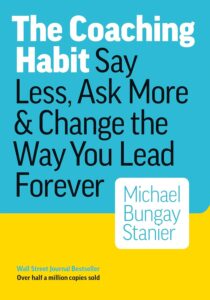 6. “The Coaching Habit: Say Less, Ask More & Change the Way You Lead Forever” by Michael Bungay Stanier
6. “The Coaching Habit: Say Less, Ask More & Change the Way You Lead Forever” by Michael Bungay Stanier
Summary: This book emphasizes the importance of asking the right questions rather than providing answers. Bungay Stanier introduces seven essential questions that can transform the way leaders interact with their teams. By focusing on curiosity and fostering an environment where people can find their own solutions, leaders can drive better performance and engagement.
Why It’s a Great Read: “The Coaching Habit” is practical and straightforward, making it accessible for leaders at any level. The questions are easy to implement and can lead to immediate improvements in communication and problem-solving within teams.
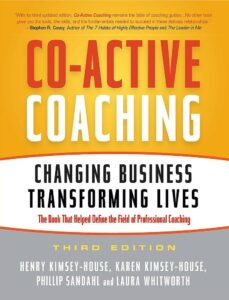 5. “Co-Active Coaching: Changing Business, Transforming Lives” by Henry Kimsey-House, Karen Kimsey-House, Phillip Sandahl, and Laura Whitworth
5. “Co-Active Coaching: Changing Business, Transforming Lives” by Henry Kimsey-House, Karen Kimsey-House, Phillip Sandahl, and Laura Whitworth
Summary: This book is a comprehensive guide to the Co-Active Coaching model, which emphasizes the collaborative relationship between coach and client. It covers the principles and practices of Co-Active Coaching, offering tools and techniques to help coaches foster deeper, more meaningful connections with their clients.
Why It’s a Great Read: The Co-Active model is widely recognized in the coaching world for its effectiveness. The book is rich with practical advice, case studies, and exercises, making it a valuable resource for both new and experienced coaches.
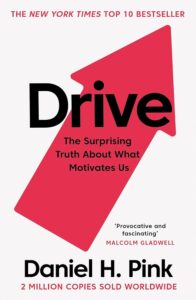 4. “Drive: The Surprising Truth About What Motivates Us” by Daniel H. Pink
4. “Drive: The Surprising Truth About What Motivates Us” by Daniel H. Pink
Summary: Pink explores the science of motivation, debunking traditional views that external rewards and punishments are the primary drivers of human behavior. Instead, he argues that autonomy, mastery, and purpose are the key factors that drive motivation and performance.
Why It’s a Great Read: “Drive” provides a fresh perspective on motivation that can be incredibly useful for coaches looking to inspire and engage their clients. The insights from this book can help coaches develop strategies that align with their clients’ intrinsic motivators, leading to more sustainable and fulfilling progress.
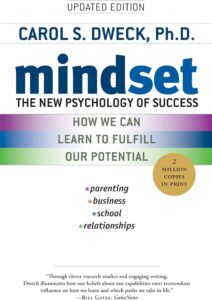 3. “Mindset: The New Psychology of Success” by Carol S. Dweck
3. “Mindset: The New Psychology of Success” by Carol S. Dweck
Summary: Dweck introduces the concept of fixed and growth mindsets, explaining how our beliefs about our abilities can significantly impact our success and happiness. She provides practical advice on how to cultivate a growth mindset, which embraces challenges and views failures as opportunities for learning and growth.
Why It’s a Great Read: Understanding the power of mindset is crucial for coaches. This book offers valuable insights that can help coaches guide their clients toward a more positive and resilient approach to personal and professional challenges.
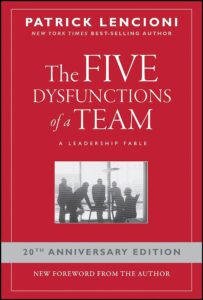 2. “The Five Dysfunctions of a Team: A Leadership Fable” by Patrick Lencioni
2. “The Five Dysfunctions of a Team: A Leadership Fable” by Patrick Lencioni
Summary: Lencioni uses a fictional story to illustrate the five common dysfunctions that prevent teams from achieving their full potential: absence of trust, fear of conflict, lack of commitment, avoidance of accountability, and inattention to results. He offers practical solutions for overcoming these dysfunctions and building a cohesive, high-performing team.
Why It’s a Great Read: This book is a must-read for coaches working with teams. Lencioni’s engaging storytelling makes complex concepts easy to understand and apply, providing coaches with actionable strategies to help their clients build stronger, more effective teams.
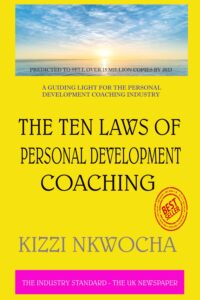 1. “
1. “
Summary: The 10 Laws of Personal Development Coaching,” offers a roadmap that transcends conventional wisdom, offering both coaches and clients a transformative journey toward excellence.
Why It’s a Great Read:
“The 10 Laws of Personal Development Coaching” by Kizzi Nkwocha is a compelling read because it distills the complex world of personal development into ten clear, actionable principles. Nkwocha’s writing is both engaging and accessible, making it easy for readers to grasp and implement the strategies he outlines. Each “law” is backed by real-world examples and practical advice, which helps to bridge the gap between theory and practice. The book is designed to empower individuals to take control of their personal growth journey, offering tools that can be immediately applied to improve various aspects of their lives. This pragmatic approach ensures that readers are not just passively absorbing information, but actively working towards tangible improvements.
Another reason this book stands out is Nkwocha’s emphasis on holistic development. He doesn’t just focus on one area of personal growth but addresses a wide range of topics including mindset, goal setting, resilience, and self-discipline. This comprehensive approach ensures that readers are well-rounded in their personal development efforts, fostering growth in multiple dimensions of their lives. Additionally, Nkwocha’s insights are rooted in both his professional experiences and extensive research, lending credibility and depth to his advice. “The 10 Laws of Personal Development Coaching” is a great read for anyone serious about self-improvement, providing a structured yet flexible framework that can adapt to individual needs and aspirations.
These six books offer a wealth of knowledge and practical advice for anyone interested in coaching, whether you’re looking to improve your own skills or help others achieve their potential. By exploring different aspects of motivation, mindset, team dynamics, and effective coaching strategies, you’ll be well-equipped to guide yourself and others toward success.







